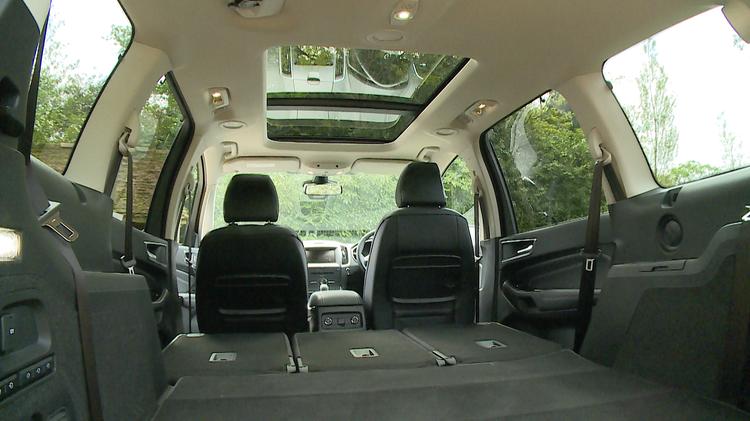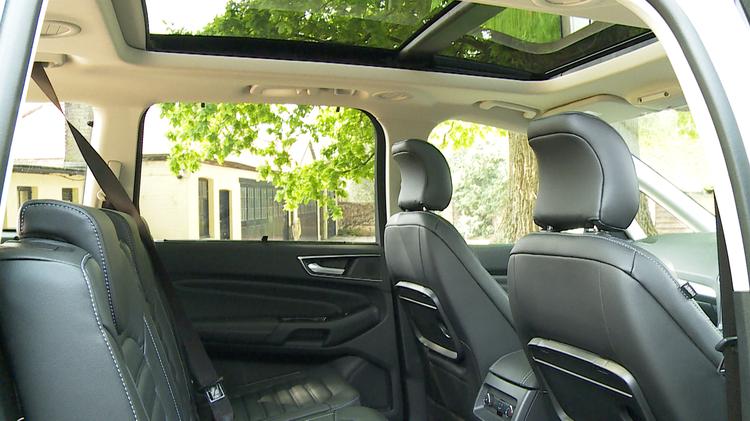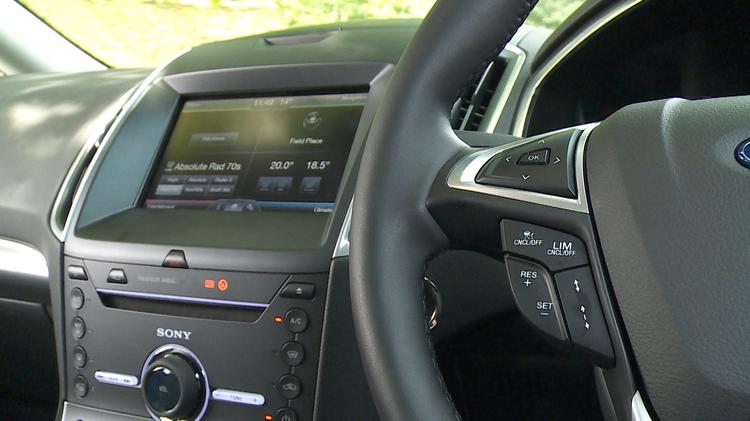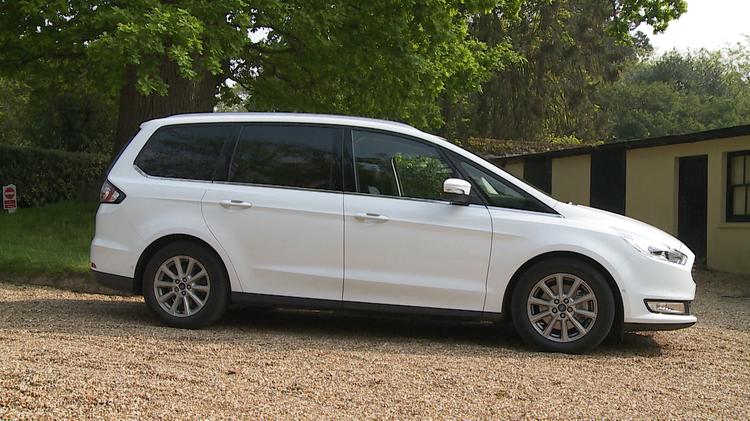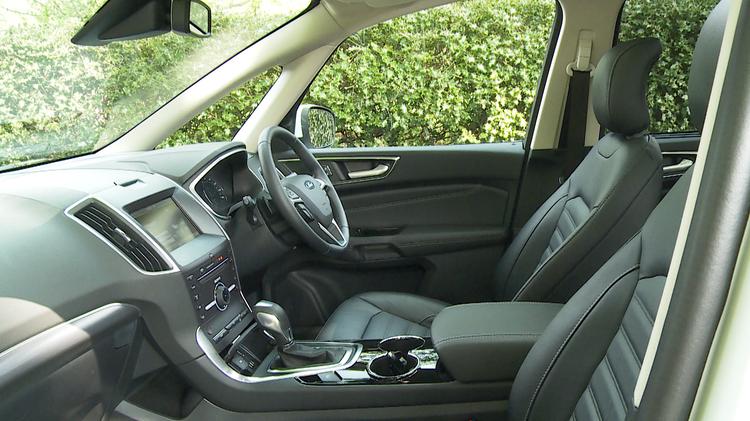Ford has decided that the latest version of the Galaxy needs a bit more than mere practicality. Jonathan Crouch reports
Ford brings us an improved version of its fourth-generation Galaxy seven-seater, a model that's more efficient thanks to a hi-tech pair of EcoBlue diesel engines and the option of petrol self-charging Hybrid power. Plus it's better connected and continues with practical virtues that include an innovative third seat folding system. With a wide range of options and pleasing interior quality, this one's going to be at the top of quite a few family shortlists.
On the face of it, building a large MPV ought to be easy. After all, isn't something like this just a big box on wheels? It always used to be. Not so long ago, all you really needed with a car like this was a set of fancy flippy-folding seats and a few clever interior storage solutions. That and the ability for the model in question not to fall over when presented with a corner. These days, things are a lot tougher for those brands looking to create a design of this kind. Buyers are more demanding. They want the interior build quality of a luxury saloon. They want exciting styling. And the last thing they're looking for is the kind of handling you'd expect from a big box on wheels. The game has changed.
These objectives are inevitably difficult to achieve. It's hard to give an MPV sharp handling and even more difficult to make such a car grab your attention from a visual perspective. Still, Ford managed to do both of these things with the first generation version of their sporty S-MAX People Carrier. Buoyed by the success of that vehicle, the Blue Oval brand carried forward what it learnt from that project into the S-MAX's squarer showroom stablemate, this fourth generation Galaxy, here usefully improved.
Ford has now introduced its 2.5-litre 190PS Duratec self-charging petrol Hybrid engine to the line-up as an alternative to black pump fuel; you can't plug it in, but it will improve your efficiency to near-diesel levels - and probably lower your tax bill. Otherwise, the range still hinges around a much improved family of EcoBlue 2.0-litre turbodiesel engines, offered in 150 and 190PS outputs. The 150PS form unit offers a choice of manual or auto transmission, but most will want the 190PS version of this engine, which has be be mated to 8-speed auto transmission and puts out a lusty 400Nm of torque.
With the 190PS variant, there's also the option of the brand's 'Intelligent All-Wheel Drive' system - which will be a welcome boon for towers who in this form can pull up to 2,000kgs. The AWD system continually measures how the car's wheels are gripping the road surface every 16 milliseconds; can adjust power delivery to individual wheels in 100 milliseconds; and can send 100 per cent of available engine torque to the rear wheels.
Copious use of sound-deadening materials and thick door seals contribute to a particularly quiet cabin. Self-levelling rear suspension is also available. Adaptive electronic steering is a standard fitment and includes the intriguingly-named 'Active Nibble Compensation' system that cancels out unwanted feedback, forces and vibration at the helm. The rear suspension is the same integral link set-up as seen on the current Mondeo. It's good, in other words.
A bit of extra chrome embellishes the front end of this improved Galaxy model, but otherwise, it's as before. Ford has endowed the Galaxy with a very S-MAX-style front end, so you get that car's Aston Martin-style front grille, along with plenty of shape in the flanks to avoid that slab-sided look that makes so many large MPVs look like panel vans with windows. The old MK3 model wasn't a bad looking thing, but Ford has clearly decided to give the shape a little extra edge. As with previous Galaxy models, you don't get sliding side doors, but then that helps keep the side profile clean.
The interior might surprise you in terms of perceived quality, with Ford offering a big 10-inch digital display and the excellent SYNC3 infotainment system. This revised model can be ordered with 18-way adjustable front seats that can help provide relief for back pain-sufferers on the road, having achieved recognition from the AGR's independent testing committee of medical experts. There's certainly no shortage of space inside, with up to 32 seating and load-space combinations, as well as innovative Easy Fold Seats for the second and third rows. The system enables each rear seat to be folded flat from a push-button control panel in the bootspace. A Power Raise function is also available for Galaxy third row seats.
A lot of thought has clearly gone into making the third row of seats something other than the most obvious short straw and they get their own armrest storage and cup holders. You won't have to wrestle the seats up and down either. They can be raised from the boot floor at the touch of a button and both second and third rows can also be dropped flat from the front by using a console-mounted button. There's an additional 20-litres of stowage beneath the flat boot floor and the door bins are significantly sized too.
Prices start at around £34,000 for a base 'Zetec' manual-only variant with the entry-level 2.0 EcoBlue 150PS diesel engine. Most will want to stretch on up to plusher 'Titanium' trim, which starts from around £35,500 and gives you the choice between manual or auto bersions of the same 150PS diesel engine. If you're happy with an auto, you might want to consider the uprated 190PS version of this 2.0-litre diesel powerplant, which comes only in auto form and offers the choice of front wheel drive or AWD. Ig you want an alternative to diesel power, at the top of the range, for around £39,000, you'll be offered Ford's 2.5-litre Duratec 190PS self-charging Hybrid petrol engine, which comes only with a CVT automatic gearbox.
It's interesting that the styling of this fourth generation Galaxy borrows so much from the Blue Oval brand's S-MAX large MPV (which costs slightly less). Ford has tried to position these two People carriers quite differently, giving the Galaxy a more practically-orientated family feel.
All Galaxy models feature the 'FordPass Connect' media system. In addition to enabling WiFi hotspot capability, this technology allows for a range of convenient features via the FordPass mobile app, including a Vehicle Locator; a 'Vehicle Status' feature that checks fuel levels, alarm status, oil life and more; and a remote Door Lock/Unlock system. Local Hazard Information functionality - enabled by the FordPass Connect on-board modem - can inform drivers of a hazardous situation on the road ahead, even if the incident is not visible due to a bend in the road or other vehicles. Local Hazard Information notifications are delivered independent of sat-nav, based on up-to-the minute data provided by HERE Technologies - sourced from local authorities, emergency services, and driving data from other vehicles.
The entire of the Galaxy range meets stringent Euro6d emissions regulations and Ford claims to have improved the fuel economy of every version across the range. Both the 2.0-litre EcoBlue diesel engines return decent WLTP-rated economy. In the 150PS variant with manual transmission, you'll see up to 46.3mpg on the WLTP combined cycle and 160g/km of carbon dioxide. Nearer the top of the range, the 190PS version of this unit (which has to be mated with 8-speed auto transmission) manages up to 43.5mpg in 2WD form with 170g/km emissions. Or up to 40.9mpg and 180g/km in AWD form. The 2.5-litre front driven petrol self-charging Hybrid variant manages up to 43.5mpg and 148g/km.
The warranty is a 3 year/60,000 mile deal with Ford Assistance for 1 year, providing roadside assistance in the UK and throughout Europe. In addition, buyers should get healthier residual values that they might expect from a Ford. Low-ish depreciation has long been a Galaxy staple, used buyers recognising its safety, durability and low ongoing running costs.
This model's always been one of the very strongest contenders in the large MPV segment and this improved version of the MK4 model still is. All of the key areas for improvement that were identified with earlier Galaxys seem to have been given a good ticking, with better economy, sharp looks, improved interior quality, slicker technological integration and a richer array of high-tech safety features. All of these things are present and correct.
Under the skin too, this fourth generation model seems to have been made from the good stuff, its extended platform and clever rear suspension teaming with a pair of frugal diesel engines to offer drivers something a bit different to usual dull MPV driving experience. Building a big MPV is all about managing compromises without taking your eye off the prime consideration, that of safe and spacious family transportation. Ford has, down the years, been a bit cleverer at figuring out those compromises than most of its rivals. In short, the Galaxy looks as if it's going to continue to set a very high bar.
